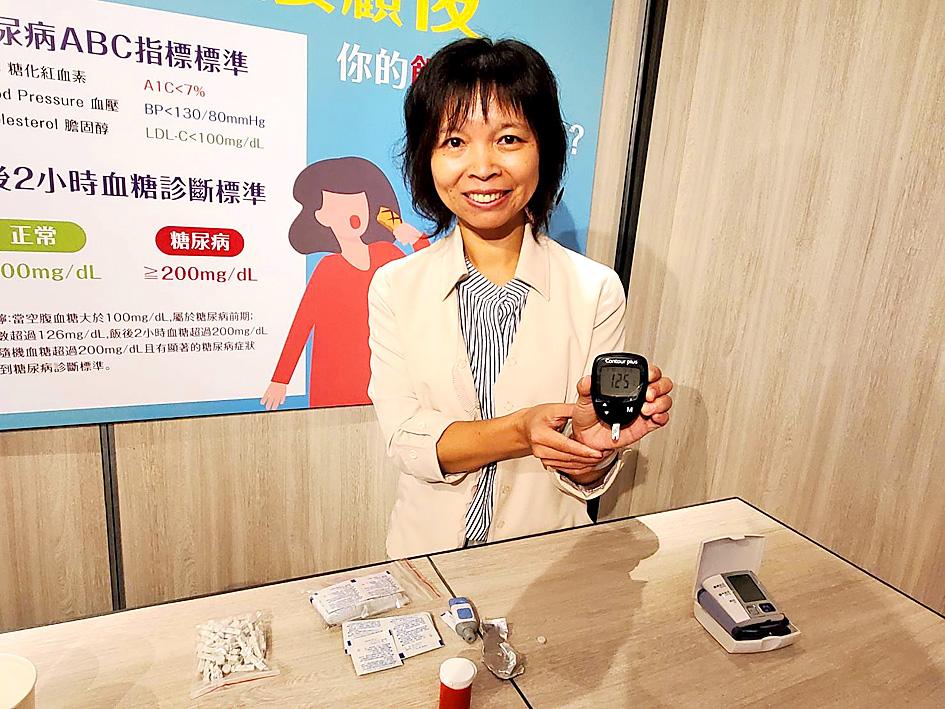One in 10 Taiwanese, or 2.2 million people, have diabetes, and some are in danger of being unable to manage their blood glucose level because they are unwilling to take insulin, a survey released yesterday by the Formosan Diabetes Care Foundation showed.
More than 30 percent of people in Taiwan with diabetes — those with a hemoglobin A1c (HbA1c) level of 7 percent or higher — cannot manage their blood sugar level, even though they are taking three or more oral medications, the survey showed.
A doctor should assess a diabetic’s condition when they do not respond to a combined drug treatment, then consider using insulin injections to mitigate the risk of them developing complications from the disease, said foundation director Li Hung-yuan (李弘元), who is a National Taiwan University Hospital doctor.

Photo: Lin Hui-chin, Taipei Times
The survey showed that among people with a HbA1c level of more than 9 percent, 54.4 percent were advised by doctors at least twice to take insulin, Li said.
“Most doctors and nurses will advise people to consider insulin treatment, which can benefit most diabetics,” he said.
Some people do not want to take insulin at first, even though diabetes causes cell production of insulin to decline 4 to 5 percent annually, but with early use of insulin injections, the rate can be reduced in pancreas cells, he said.
“Once cells stop producing insulin, it cannot be reversed,” Li said. “If the deterioration of pancreas cells goes unabated, then their bodies would be unable to control their blood sugar level in the long term. If insulin treatment is started early, it can relieve the burden on remaining pancreas cells that are still functioning.”
Many diabetics are afraid of needles, and therefore rely on oral medication, he said.
Thirty percent of people with diabetes are unwilling to take insulin injections, believing that other treatments are available, while another 30 percent say that insulin injections are inconvenient, he said, citing the survey.
“Insulin is a hormone, naturally produced by the human body. It does not interfere with the kidneys, nor will it cause other complications. Diabetes is caused by insufficient insulin not functioning to control blood sugar, or due to insulin resistance,” he said.
“Taking insulin injections can stabilize blood sugar levels, and mitigate the damage to pancreas cells from overproduction,” he added.
“Nowadays people can use insulin pens, which are much smaller with sharper needles, for more convenient use, and do not disrupt most people’s daily lives,” he said.
The foundation cited a case of a woman surnamed Chen (陳), 71, who has lived with diabetes for 12 years. For five years she took three oral medications to reduce her blood sugar level, but her HbA1C level still exceeded 8.5 percent.
She was therefore put on a rigorous diet, and had to give up many of her favorite dishes, it said.
After consulting medical experts for many years and with the onset of diabetic retinopathy — which can cause blindness if left untreated — she agreed to take insulin, and her HbA1C level fell to below 7 percent within three months, while also reducing her need for oral medicine, it said.
She also started to cook again with friends and was able to enjoy her favorite dishes, it said, adding that she said she regretted not taking insulin earlier, so that she could have avoided many years of discomfort.

Former Czech Republic-based Taiwanese researcher Cheng Yu-chin (鄭宇欽) has been sentenced to seven years in prison on espionage-related charges, China’s Ministry of State Security announced yesterday. China said Cheng was a spy for Taiwan who “masqueraded as a professor” and that he was previously an assistant to former Cabinet secretary-general Cho Jung-tai (卓榮泰). President-elect William Lai (賴清德) on Wednesday last week announced Cho would be his premier when Lai is inaugurated next month. Today is China’s “National Security Education Day.” The Chinese ministry yesterday released a video online showing arrests over the past 10 years of people alleged to be

THE HAWAII FACTOR: While a 1965 opinion said an attack on Hawaii would not trigger Article 5, the text of the treaty suggests the state is covered, the report says NATO could be drawn into a conflict in the Taiwan Strait if Chinese forces attacked the US mainland or Hawaii, a NATO Defense College report published on Monday says. The report, written by James Lee, an assistant research fellow at Academia Sinica’s Institute of European and American Studies, states that under certain conditions a Taiwan contingency could trigger Article 5 of NATO, under which an attack against any member of the alliance is considered an attack against all members, necessitating a response. Article 6 of the North Atlantic Treaty specifies that an armed attack in the territory of any member in Europe,

LIKE FAMILY: People now treat dogs and cats as family members. They receive the same medical treatments and tests as humans do, a veterinary association official said The number of pet dogs and cats in Taiwan has officially outnumbered the number of human newborns last year, data from the Ministry of Agriculture’s pet registration information system showed. As of last year, Taiwan had 94,544 registered pet dogs and 137,652 pet cats, the data showed. By contrast, 135,571 babies were born last year. Demand for medical care for pet animals has also risen. As of Feb. 29, there were 5,773 veterinarians in Taiwan, 3,993 of whom were for pet animals, statistics from the Animal and Plant Health Inspection Agency showed. In 2022, the nation had 3,077 pediatricians. As of last

XINJIANG: Officials are conducting a report into amending an existing law or to enact a special law to prohibit goods using forced labor Taiwan is mulling an amendment prohibiting the importation of goods using forced labor, similar to the Uyghur Forced Labor Prevention Act (UFLPA) passed by the US Congress in 2021 that imposed limits on goods produced using forced labor in China’s Xinjiang region. A government official who wished to remain anonymous said yesterday that as the US customs law explicitly prohibits the importation of goods made using forced labor, in 2021 it passed the specialized UFLPA to limit the importation of cotton and other goods from China’s Xinjiang Uyghur region. Taiwan does not have the legal basis to prohibit the importation of goods